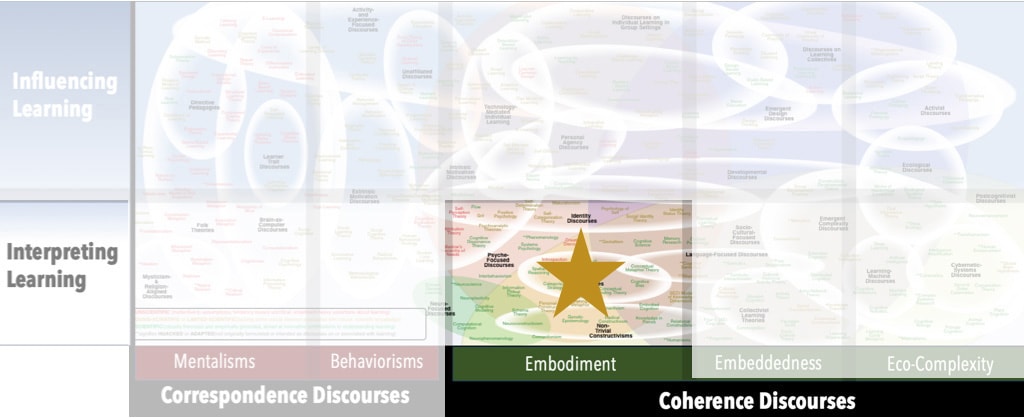AKA
Freud's Theory of Learning
Freudian Theory of Personality
Psychoanalytic Sexual Drive Theory
Sexual Drive Theory
Focus
Distinct phases in the development of one’s instinctual libido (sexual energy)Principal Metaphors
- Knowledge is … range of developmental possibility
- Knowing is … functioning adequately
- Learner is … a developing agent
- Learning is … mastering stage-specific anxieties
- Teaching is … N/A
Originated
1890sSynopsis
An element of Psychoanalytic Theories, the theory of Psychosexual Development is based on Sigmund Freud's observation that children’s behaviors are oriented towards particular parts of their bodies during predictable phases. Five stages (described below) are identified. Each is anchored to an “erogenous zone” and associated with an anxiety that must be mastered in order to avoid the emergence of a neurosis in adulthood:- Oral Stage (Sigmund Freud, 1890s) – the first stage of Psychosexual Development Theory, spanning birth to approximately 1 year of age, during which the infant’s primary site of engagement and gratification is the mouth. If a fixation occurs at this stage, one might develop issue with dependency, aggression, and mouth-focused obsessions (e.g., drinking, overeating, smoking, thumb-sucking).
- Anal Stage (Sigmund Freud, 1890s) – the second stage of Psychosexual Development Theory, spanning approximately 1 to 3 years of age, during which the toddler’s primary sites of engagement and gratification are the bowel and bladder. Fixations that might occur at this stage are attributed to overly lenient or overly strict parenting:
- Anal Expulsive Personality (Sigmund Freud, 1890s) – one who is untidy, wasteful, disorganized, destructive, and/or defiant, purportedly because of overly lenient parenting
- Anal Retentive Personality (Sigmund Freud, 1890s) – one who is excessively (or obsessively) orderly and/or inflexible, purportedly because of overly strict parenting
- Phallic Stage (Sigmund Freud, 1890s) – the third stage of Psychosexual Development Theory, spanning approximately 3 to 6 years of age, during which the genitals become the primary focus. Children begin to see their same-sex parent as rival for the affections of their opposite-sex parent, but eventually come to identify with the same-sex parent. A fixation at this stage might lead to egoism, low self-esteem, and promiscuity. Associated constructs, both original and more recent, include:
- Oedipus Complex (Œdipus Complex) (Sigmund Freud, 1890s) – purportedly, a phase in every child’s life associated with a rivalry and hatred of the father over affections for the mother. Proposed consequences include:
- Castration Anxiety (Sigmund Freud, 1890s) – the fear among young boys of being literally or metaphorically emasculated by the father as punishment for one’s desires for the mother
- Penis Envy (Sigmund Freud, 1910s) – an anxiety among young girls arising from the realization that they don’t have a penis
- Power Envy (Karen Horney, 1950s) – proposed as a counter to Penis Envy, an anxiety and frustration among females arising from the realization that males are afforded unjustified power
- Electra Complex (Carl Jung, 1910s) – purportedly, a phase in every girl’s life associated with a rivalry and hatred of the mother over affections for the father. Proposed consequences include:
- Womb Envy (Womb and Vagina Envy) (Margaret Mead, Karen Horney, 1940s) – the jealousy experienced by males over the female’s capacities to bear and nurse children
- Oedipus Complex (Œdipus Complex) (Sigmund Freud, 1890s) – purportedly, a phase in every child’s life associated with a rivalry and hatred of the father over affections for the mother. Proposed consequences include:
- Latency Stage (Latent Period) (Sigmund Freud, 1890s) – the fourth stage of Psychosexual Development Theory, spanning approximately 6 to 12 years of age, during which social skills are developed, values consolidate, and peer relationships are established. Sexual energy, while present, is sublimated to intellectual and social pursuits. If a fixation occurs at this stage, one might be unable to form stable and fulfilling relationships.
- Genital Stage (Sigmund Freud, 1890s) – the fifth and final stage of Psychosexual Development Theory, starting approximately at 12 years of age, during which sexual energy is once again active, but balanced against a need to conform to social norms. Interests the welfare of others emerge as relationship skills are honed.
Commentary
Perhaps the most common criticism of Psychosexual Development was that Sigmund Freud was fixated on sexuality in a way that compelled him to overemphasize some elements of personal development and ignore other (perhaps much more impactful) elements. As well, and as with most other Developmental Discourses, the perspective is frequently criticized for being extremely sexist and normative, thus failing to account for broad variations among individuals and across cultures. While still embraced by some educational researchers and teachers, the theory tends to be marginalized and dismissed as irrelevant to the concerns of schooling.Authors and/or Prominent Influences
Sigmund FreudStatus as a Theory of Learning
Psychosexual Development is a theory of learning.Status as a Theory of Teaching
Psychosexual Development is a not theory of teaching, but it has been used to as a source of insight and advice on age- and stage-appropriate knowledge and activity in formal educational settings.Status as a Scientific Theory
Psychosexual Development meets most of our requirements to be classified as a scientific theory. Its focus is explicit, its images and metaphors are carefully selected and deployed, and it does have an evidence base. That said, in the judgment of many, it has failed to answer to counter-evidence and other Developmental Discourses have been argued to offer more encompassing and integrated insights into elements of sexual development.Subdiscourses:
- Anal Expulsive Personality
- Anal Retentive Personality
- Anal Stage
- Castration Anxiety
- Electra Complex
- Genital Stage
- Latency Stage (Latent Period)
- Oedipus Complex (Œdipus Complex)
- Oral Stage
- Penis Envy
- Phallic Stage
- Power Envy
- Womb Envy (Womb and Vagina Envy)
Map Location

Please cite this article as:
Davis, B., & Francis, K. (2023). “Psychosexual Development Theory” in Discourses on Learning in Education. https://learningdiscourses.com.
⇦ Back to Map
⇦ Back to List
